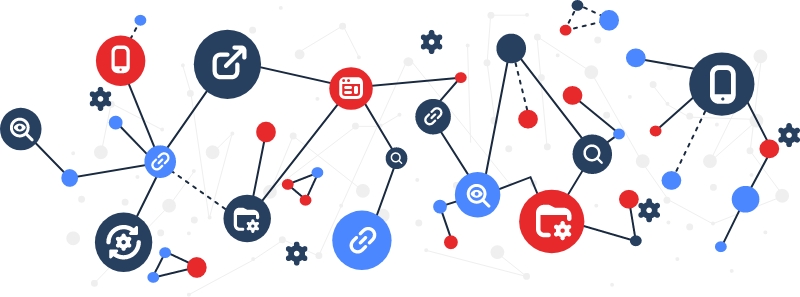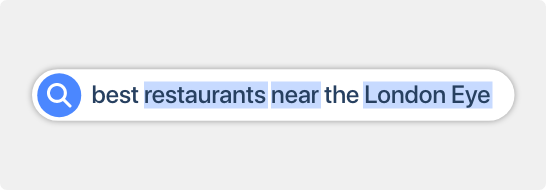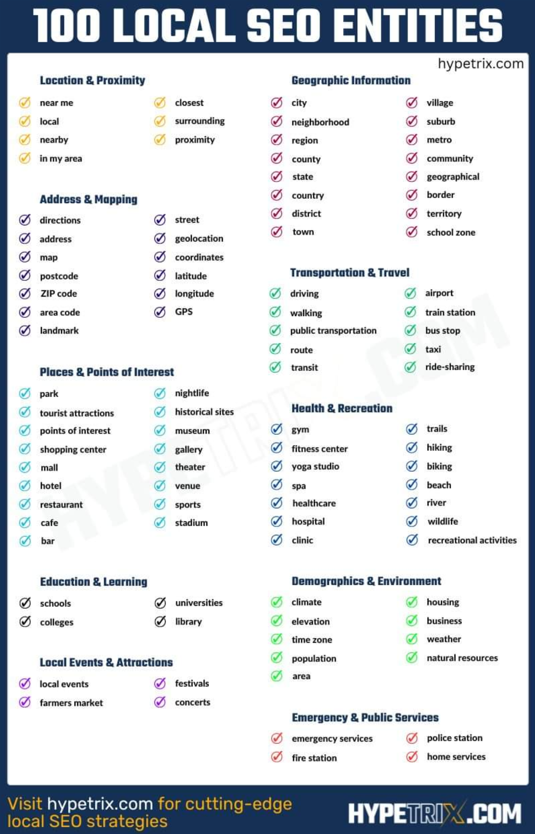If you're even a little bit familiar with SEO, you probably have a pretty good idea of what keywords are, but what about entities? And no, we're not talking about paranormal beings or anything like that — entities in SEO are kind of like parents to keywords, and they can be a powerful tool for improving local relevance to boost your rankings in local search results.
What Are Entities in SEO?
An entity in SEO is a distinct and well-defined piece of information, such as a person, place, organization, event, or concept, that search engines recognize and understand as a unique object. These entities have a very specific meaning and context that help search engines interpret and organize information more accurately.
To elaborate further, let's take a look at how Google defines an SEO entity:
"”¦a thing or concept that is singular, unique, well-defined and distinguishable. For example, an entity may be a person, place, item, idea, abstract concept, concrete element, other suitable thing, or any combination thereof. Generally, entities include things or concepts represented linguistically by nouns. For example, the color "Blue," the city "San Francisco," and the imaginary animal "Unicorn" may each be entities. "
The role of entities in SEO is to help search engines connect different pieces of information and provide more relevant results. For example, "London Eye" is an entity representing a specific landmark in London, England.
Search engines, particularly Google, use entities to build knowledge graphs, which are networks of interconnected entities that improve search result relevance by understanding relationships and context.

By optimizing for entities, or doing entity-based SEO, businesses can improve their visibility in search results, particularly for local searches.
Incorporating local entities into your content and structured data helps search engines better understand your business, leading to more accurate and relevant search results for users.
SEO Entities vs Keywords
In the world of SEO, keywords are specific words, combinations of words, or phrases that users enter into a search engine search bar to pull up certain information they're looking for. These keywords are also known as search queries.
Now, you might be wondering what the difference is between a keyword and an entity in SEO. After all, a place name like "London Eye" is certainly an entity and a keyword, since tons of people search for information on the London Eye using just those two words.
However, keywords are often long-tailed queries that may contain multiple entities. For example, "best restaurants near the London Eye" is a keyword containing the entities "London Eye," "near," and "restaurants." In this sense, you can think of keywords as being derived from entities.
The multiple entities contained within a search query allow search engines to determine the user's search intent, so they can show the user the information most relevant to their search (by looking for content and sites that contain the same entities).
This is especially important for local searches, where users are looking for locally relevant information, often in a hyper-local area, such as "near the London Eye."

Using Entities To Improve Local Relevance
Because of how entities help search engines connect information to improve the relevance of search results for users, it's important for local businesses to think not only in terms of keywords when optimizing their content and sites, but also in terms of local SEO entities.
Naturally, there will be some overlap in keyword-based and entity-based SEO, and incorporating entity SEO into your local search optimization strategy can even help you find new keywords to optimize for.
How To Find SEO Entities for Local SEO
The first step to getting started with entity-based SEO is to determine which entities are most relevant to your business.
Local SEO entities can come from many different places. For example, they might come from specific geographic or address information, or names of tourist attractions or other points of interest. They can also come from events, activities, and services.
Here's a great infographic from Tim Kahlert of Hypetrix that organizes 100 locally-relevant entities into 10 essential categories:

Keep in mind that, while there will be some overlap between entities and business-related keywords you're targeting, not all the entities you choose to optimize for need to be directly related to your business. Remember that they just need to help Google start building connections between your business and locally-relevant entities.
Integrate Local SEO Entities into Content
Once you've identified some key local entities for your business, you can work on incorporating them into your content to help improve its relevance to local searches.
Focus on creating entity-rich content by writing blog posts or articles centered around these local entities.
For example, a blog post titled "Top 10 Attractions Near [Your Business]" can highlight local landmarks and places of interest and provide detailed information about each one.
This helps search engines start building connections between your business and nearby attractions. That way, when people search for businesses like yours near those places, they'll be more likely to see your business in search results.
Add Local SEO Entities to Schema Markup
Schema markup is another powerful tool for helping search engines understand your business's entities and local relevance.
Begin by implementing Google's LocalBusiness schema for your business type, which includes detailed information like your address, business hours, and services offered. This structured data helps search engines categorize your business correctly and display relevant information in search results, improving your visibility and local relevance.
In addition to the LocalBusiness schema, use the Place schema for any content that mentions local places. This markup allows search engines to identify and connect the mentioned places as entities related to your business, further enhancing your local SEO.
For instance, if your content references a nearby park or tourist attraction, the Place schema can provide structured information about that location, helping search engines draw connections between your business and the local area.
For events your business hosts or participates in, utilize the Event schema. This schema provides structured information about events, including the event name, date, location, and description.
By marking up events with the Event schema, you ensure that search engines have a clear understanding of these activities, which can improve your visibility in local search results.
Whether it's a special promotion, a community gathering, or a local festival, using the Event schema helps search engines present this information accurately to users searching for related activities in your area.
Conclusion
Optimizing for entities in SEO goes beyond traditional keyword strategies and helps search engines better understand the context and relevance of your business in a local setting.
By focusing on incorporating different categories of local entities, such as places and points of interest or local events and attractions, you can create more meaningful and specific content that resonates with both search engines and users.
Building more entity-rich site descriptions and structured data, specifically schema markup, can also boost your business's local relevance and visibility in local search results.
In short, entity-based SEO is a powerful strategy that can help you connect with your local audience, improve search rankings, and drive more traffic to your business!

